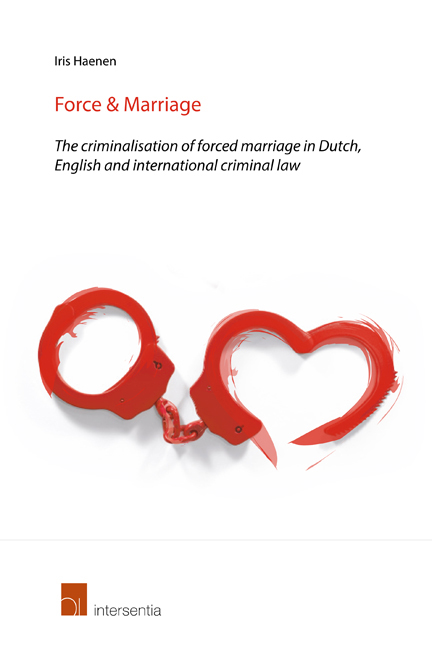 Force & Marriage
Force & Marriage Book contents
- Frontmatter
- Acknowledgements
- Contents
- Abbreviations
- General introduction
- PART I FORCE AND MARRIAGE: Description and definition of forced marriage
- PART II A TALE OF TWO THEORIES: Criminalisation on the level of national law and international law
- PART III THE LAW AND FORCED MARRIAGE: Legal frameworks concerning forced marriage in Dutch, English and international criminal law
- Chapter 7 Dutch and English law and forced marriage
- Chapter 8 International criminal law and forced marriage
- Chapter 9 Two-level legal comparison
- PART IV ANALYSIS AND CONCLUSIONS
- Summary
- Bibliography
- Table of cases
- Curriculum vitae
- Index
Chapter 7 - Dutch and English law and forced marriage
from PART III - THE LAW AND FORCED MARRIAGE: Legal frameworks concerning forced marriage in Dutch, English and international criminal law
Published online by Cambridge University Press: 22 November 2017
- Frontmatter
- Acknowledgements
- Contents
- Abbreviations
- General introduction
- PART I FORCE AND MARRIAGE: Description and definition of forced marriage
- PART II A TALE OF TWO THEORIES: Criminalisation on the level of national law and international law
- PART III THE LAW AND FORCED MARRIAGE: Legal frameworks concerning forced marriage in Dutch, English and international criminal law
- Chapter 7 Dutch and English law and forced marriage
- Chapter 8 International criminal law and forced marriage
- Chapter 9 Two-level legal comparison
- PART IV ANALYSIS AND CONCLUSIONS
- Summary
- Bibliography
- Table of cases
- Curriculum vitae
- Index
Summary
INTRODUCTION
In this chapter, the Dutch and English legal frameworks relevant to forced marriages are discussed, starting with the former. Forced marriages have been on the Dutch political agenda since 2005 and the wish to tackle this issue has resulted in several legal amendments. In 2009, the Dutch government drafted a broad set of measures for the purpose of combating the problems associated with protracted integration and emancipation of family migrants. These measures include changes in the civil and criminal law pertaining to polygamy, forced marriage, marriages between cousins and raising the minimum age for marriage in private international law. Forced marriage was also included in the Public Prosecution Service Instruction on domestic violence and honour related violence, in the sense that the Public Prosecution Service (PPS) will have to act pursuant to this instruction if forced marriage or abandonment are in any way connected with honour-related offences. In 2012, after looking into the possibilities of creating a separate offence of forced marriage, the Dutch government decided against separate criminalisation and instead presented a twoiyear action plan concerning the prevention of forced marriages, containing a set of preventative measures, mainly aiming at providing information, raising awareness and training professionals.
This chapter first describes the civil law remedies in detail. Next, other remedies that can be used to tackle forced marriages are briefly examined, including remedies that have their basis in administrative law. The focus is then directed towards criminal law: which crimes are relevant in cases of forced marriage and what amendments did the government propose in response to the call for the creation of a distinct offence of forced marriage?
The second part of this chapter describes the English legal framework in the context of the practice of forced marriage. English courts have quite a long history when it comes to dealing with cases of forced marriage, but the phenomenon entered the political limelight only relatively recently. In the late 1990s, several high profile cases attracted media attention and outraged the British public, causing two Members of Parliament to place the issue of forced marriage on the political agenda.
- Type
- Chapter
- Information
- Force & MarriageThe criminalisation of forced marriage in Dutch, English and international criminal law, pp. 195 - 262Publisher: IntersentiaPrint publication year: 2014


